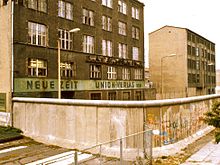
Neue Zeit was the official organ of the Christian Democratic Union of the German Democratic Republic, first published on 22 July 1945. [1] [2] The paper was published on a daily basis. [3] It ceased publication on 5 July 1994. [3]

Neue Zeit was the official organ of the Christian Democratic Union of the German Democratic Republic, first published on 22 July 1945. [1] [2] The paper was published on a daily basis. [3] It ceased publication on 5 July 1994. [3]

The Christian Democratic Union of Germany was an East German political party founded in 1945. It was part of the National Front with the Socialist Unity Party of Germany (SED) and a bloc party until 1989.

Hans-Jochen Vogel was a German lawyer and a politician for the Social Democratic Party (SPD). He served as Mayor of Munich from 1960 to 1972, winning the 1972 Summer Olympics for the city and Governing Mayor of West Berlin in 1981, the only German ever to lead two cities with a million+ inhabitants. He was Federal Minister of Regional Planning, Construction and Urban Development from 1972 to 1974, and Federal Minister of Justice from 1974 to 1981. He served as leader of the SPD in the Bundestag from 1983 to 1991, and as Leader of the Social Democratic Party from 1987 to 1991. In 1993, he co-founded the organisation Gegen Vergessen – Für Demokratie. He was a member of the National Ethics Council of Germany from its beginning in 2001.

The Neue Zürcher Zeitung is a Swiss, German-language daily newspaper, published by NZZ Mediengruppe in Zürich. The paper was founded in 1780. It was described as having a reputation as a high-quality newspaper, as the Swiss-German newspaper of record, and for objective and detailed reports on international affairs.
Junge Welt is a German daily newspaper, published in Berlin. The jW describes itself as a left-wing and Marxist newspaper. German authorities categorize it as a far-left medium hostile to the constitutional order.
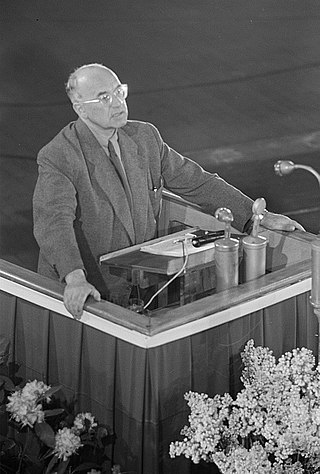
Johannes Robert Becher was a German politician, novelist, and poet. He was affiliated with the Communist Party of Germany (KPD) before World War II. At one time, he was part of the literary avant-garde, writing in an expressionist style.
Neues Deutschland is a left-wing German daily newspaper, headquartered in Berlin.
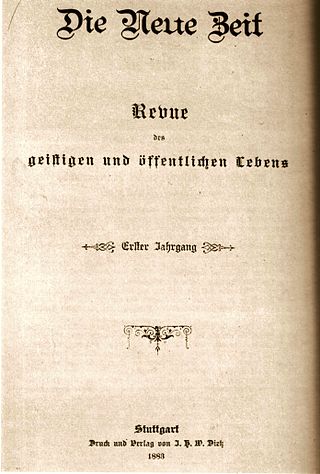
Die Neue Zeit was a German socialist theoretical journal of the Social Democratic Party of Germany (SPD) that was published from 1883 to 1923. Its headquarters was in Stuttgart, Germany.
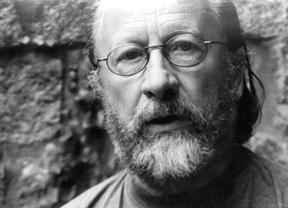
Georg Katzer was a German composer and teacher. The last master student of Hanns Eisler, he composed music in many genres, including works for the stage. Katzer was one of the pioneers of electronic new music in the German Democratic Republic and the founder of the first electronic-music studio in the GDR. He held leading positions in music organisations, first in the East, then in the united Germany, and received many awards, including the Art Prize of the German Democratic Republic, the National Prize of the German Democratic Republic, the Order of Merit of the Federal Republic of Germany, and the German Music Authors' Prize.
Friedrich Schrader was a German philologist of oriental languages, orientalist, art historian, writer, social democrat, translator and journalist. He also used the pseudonym Ischtiraki. He lived from 1891 until 1918 in Istanbul.

The old states of Germany is a jargon referring to the ten of the sixteen states of the Federal Republic of Germany (FRG) that were part of West Germany and that unified with the eastern German Democratic Republic's 5 states, which are given the contrasting term new states of Germany. Usage of this terminology usually excludes one other state, Berlin, conterminous with the capital city of the reunified nation which used to be divided, with its western part linked with West Germany.

Herbert Köfer was a German actor, voice artist, and television presenter. He was the first German TV news presenter for the East German Deutscher Fernsehfunk, and also presented the station's last news before the reunification of Germany. His first theatre engagement was in 1940, and he kept acting until the age of 100. Köfer played an SS-Hauptsturmführer in the 1963 film Nackt unter Wölfen. He was known for detective series such as Polizeiruf 110 and for comic roles. He founded his own troupe, Köfers Komödiantenbühne, in 2003, and published memoirs.
Gerd R. Ueberschär is a German military historian who specialises in the history of Nazi Germany and World War II. He is one of the leading contributors to the series Germany and the Second World War and, together with Rolf-Dieter Müller, is the author of Hitler's War in the East 1941−1945: A Critical Assessment. Both works have been published in English translations.
Christof Kreuziger is a German rower. He won gold medals for East Germany at the 1973 European Rowing Championships and the 1974 World Rowing Championships in double scull, and at the 1975 World Rowing Championships in quad scull.

The 1964 European Rowing Championships were rowing championships held on the Bosbaan regatta course in the Dutch capital Amsterdam. Women competed from 31 July to 2 August. Men competed the following week from 6 to 9 August. Men competed in all seven Olympic boat classes, and women entered in five boat classes. Many of the men competed two months later at the Olympic Games in Tokyo; women would first be allowed to compete at Olympic level in 1976.
The 1963 European Rowing Championships for men were rowing championships held on Lake Bagsværd near the Danish capital Copenhagen; the competition for women was held the following month in Moscow. The regatta in Copenhagen was held from 14 to 18 August.

The 1964 European Rowing Championships for women were rowing championships held on the Khimki Reservoir, which is part of the Moscow Canal, in Khimki near Moscow in the Soviet Union. The competition for men had been held the previous month in Copenhagen. The regatta in Khimki was held from 6 to 8 September. Five boat classes were contested. Eleven countries nominated a total of 33 boats for the regatta, which was held over 1,000 metres. Five lanes were available and this meant that in three boat classes, there was only the final: W2x, W4+, and W8+.

The 1955 European Rowing Championships for men were rowing championships held in the Belgian city of Ghent. The venue was the Watersportbaan, which was built for these championships and was part of Belgium's preparation for their bid to host the 1960 Summer Olympics. The competition for women had been held earlier in the month in Bucharest. The event in Ghent was held from 25 to 28 August and they competed in all seven Olympic boat classes. Some 400 competitors from 21 countries competed.
Bernd Frieberg is a rower who competed for East Germany.
Organizational Questions of the Russian Social Democracy, later republished as Leninism or Marxism?, is a 1904 pamphlet by Rosa Luxemburg, a Marxist living in Germany. In the text, she criticized Vladimir Lenin and the Bolshevik faction of the Russian Social Democratic Labour Party (RSDLP) for their position on democratic centralism—the theory behind a vanguard organization of communists having an elected leadership. Luxemburg argued that "spontaneity" of the proletariat is a major factor in socialist revolution. It was first published in Iskra, the RSDLP's newspaper, and Die Neue Zeit, the newspaper of the Social Democratic Party of Germany (SPD).
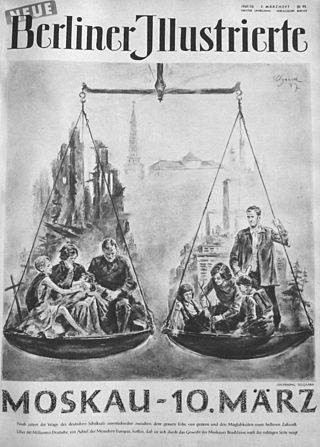
Neue Berliner Illustrierte was a weekly illustrated magazine which existed between 1945 and 1991. It was published in East Germany and then in Germany following the German reunification. Its title was a reference to Berliner Illustrirte Zeitung which was an influential German publication at the beginning of the 20th century.